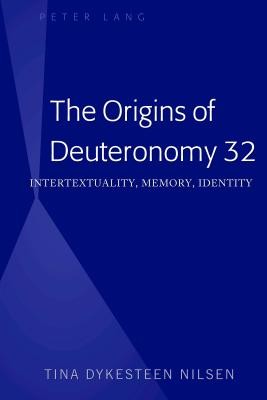
- We will send in 10–14 business days.
- Author: Tina Dykesteen Nilsen
- Publisher: Peter Lang Inc., International Academic Publishers
- ISBN-10: 143315112X
- ISBN-13: 9781433151125
- Format: 15.2 x 22.6 x 2.3 cm, hardcover
- Language: English
- SAVE -10% with code: EXTRA
Reviews
Description
The remarkable poem in Deut 32:1-43 is a triple conclusion to the life of Moses, to Deuteronomy and to the Pentateuch/Torah. In content and style, it is an encapsulation of history, prophecy, and wisdom, of a poetic quality hard to surpass. The song was supposed to be learned by heart, was given its own scroll in Qumran, and was, as far as we know, the first Hebrew text to be written colographically. Yet, the poem is shrouded in vagueness and ambiguity, and scholars have pondered its origins, function, meaning, and message.
The Origins of Deuteronomy 32: Intertextuality, Memory, Identity plunges into the debate. Extensive theoretical discussions form the foundations for an analysis of similarities and dissimilarities between Deut 32 and other texts from many different perspectives. This indicates a close relationship to the Persian period edition of the Book of Isaiah. In light of a reconstruction of Yehud, theories of social memory and social identity formation are employed in a discussion on the functions of Deuteronomy and the Book of Isaiah, yielding results for our understanding of Deut 32. The origins and textual relationships are considered in light of newer insights on scribes working together. This radically changes the framework within which we must see the origins of Deut 32 (or any text) and its textual relationships. With its combination of theoretical expositions and applications to the text, this book will be useful for both scholar and student.
EXTRA 10 % discount with code: EXTRA
The promotion ends in 15d.01:19:59
The discount code is valid when purchasing from 10 €. Discounts do not stack.
- Author: Tina Dykesteen Nilsen
- Publisher: Peter Lang Inc., International Academic Publishers
- ISBN-10: 143315112X
- ISBN-13: 9781433151125
- Format: 15.2 x 22.6 x 2.3 cm, hardcover
- Language: English English
The remarkable poem in Deut 32:1-43 is a triple conclusion to the life of Moses, to Deuteronomy and to the Pentateuch/Torah. In content and style, it is an encapsulation of history, prophecy, and wisdom, of a poetic quality hard to surpass. The song was supposed to be learned by heart, was given its own scroll in Qumran, and was, as far as we know, the first Hebrew text to be written colographically. Yet, the poem is shrouded in vagueness and ambiguity, and scholars have pondered its origins, function, meaning, and message.
The Origins of Deuteronomy 32: Intertextuality, Memory, Identity plunges into the debate. Extensive theoretical discussions form the foundations for an analysis of similarities and dissimilarities between Deut 32 and other texts from many different perspectives. This indicates a close relationship to the Persian period edition of the Book of Isaiah. In light of a reconstruction of Yehud, theories of social memory and social identity formation are employed in a discussion on the functions of Deuteronomy and the Book of Isaiah, yielding results for our understanding of Deut 32. The origins and textual relationships are considered in light of newer insights on scribes working together. This radically changes the framework within which we must see the origins of Deut 32 (or any text) and its textual relationships. With its combination of theoretical expositions and applications to the text, this book will be useful for both scholar and student.


Reviews